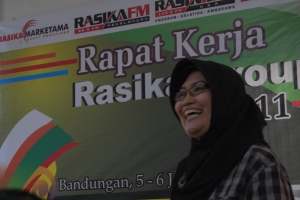Gender Equity And Participatory Development: Portrait Of A Pioneer
Location: Indonesia . 22nd Jul 2016
In the third of a series of stories celebrating and honouring the people and initiatives that have been instrumental in contributing to coastal conservation, we spoke with conservation champion Ms. Indra Kertati, Director of Lembaga Pengkaijiandan Pengembangan Sumberdaya Pembangunan Semarang (LPPSP).
Indra Kertati has been the driving force behind community coastal conservation projects in rural Indonesia. She marries activism for gender equality with environmental protection, and uses her influence as the head of an NGO to inspire others. Indra mobilises her team of 30 staff to work with her to ensure that communities’ voices are heard and that women can effectively reach their full potential.

Indra Kertati, Director of Lembaga Pengkaijiandan Pengembangan Sumberdaya Pembangunan Semarang (LPPSP) © Indra Kertati.
Recognising the importance of mangroves
Ibu Indra and her team’s latest work – part of a Mangroves for the Future (MFF) Large Grant Facility project -- is the 16-month community-based coastal management project in Gejoyo, Demak. Like many others in Asia, Demak’s coasts are faced with severe mangrove deforestation and coastal degradation due to infrastructure development and aquaculture, which in turn has adverse effects on the community. Working closely with the local Development Planning Agency (BAPPEDA), the project has helped reverse the adverse effects of development by expanding the mangrove range. A total of 286,000 mangrove seedlings were planted from 2011 to 2013.

MFF MLE team, LPPSP staff and representatives from the local women's group, in Demak Regency © Indra Kertati.
“Mangroves play a vital role in these people’s lives. An improvement in coastal conservation efforts essentially led to a better quality of life for the communities living in the area,” explained Indra
A passion for supporting communities
Earlier on in her career, Indra worked as a field officer for the non-government organization (NGO) Bintari Foundation. She was often at project sites assisting communities in improving environmental management practises, as she believed that it would improve their quality of life. It was there, on the ground, that Indra’s commitment to conservation work grew as she built trust with community members and began to realise that environmental degradation had grave implications for local communities.

Mintaragen mangrove monitoring visit in Tegal © Indra Kertati.
Serious about the issues at hand, Indra and some of her friends founded local NGO Lembaga Pengkaijiandan Pengembangan Sumberdaya Pembangunan Semarang (LPPSP) in 1998. The organisation worked with communities in Tegal, a large city in the northwest part of the Central Java Province of Indonesia, to conserve mangrove forests and sensitise the public to improving conditions in coastal areas.
“For seven years, I joined the communities and lived together with them. I explored their problems and understood their lives,” said Indra. “Some of the problems Tegal faced was the over-logging of mangroves, poor environmental sanitation, as well as low public awareness on the environment. My biggest challenge at the time was to restore degraded and damaged mangrove forests and encourage people to care about the environment. It wasn’t an easy task. For almost two years I had to fight and persist to make people aware that a healthy environment can improve their lives.”
Working closely with the government
While LPPSP was doing impressive work, it could not function to its fullest potential on its own. With great foresight, Indra connected with the local government and other NGOs to raise funds to conduct research and better understand the sandy and challenging terrain in Tegal. Today the programme runs its own course.

Hearings with the Regent of Demak, Head of Regional Development Planning Agency Demak, representatives from Bappenas © Indra Kertati.
As the Head of LPPSP, Indra continues to connect local communities, NGOs and the local government with one another to ensure that short-term projects continue to have long-term, sustained results.
“One thing I always try to do is to look at how the public can interact with the local government. Community action plans should be integrated in the budget planning, so that when the programme ends, the government can continue to support the plans. It is the government’s duty and LPPSP’s responsibility to ensure that work continues.”
End
Coming soon - Part 2 of this story: Indra’s efforts to mainstream gender into conservation.
MFF would like to thank Denise Ng, a multimedia journalist and oral history practitioner with an interest in sustainable development, for making a substantial contribution to this editorial.

Indra Kertati, Director of Lembaga Pengkaijiandan Pengembang ... © Indra Kertati